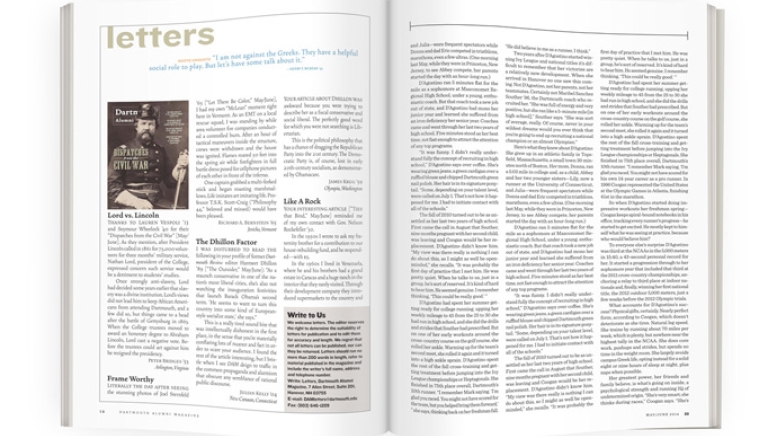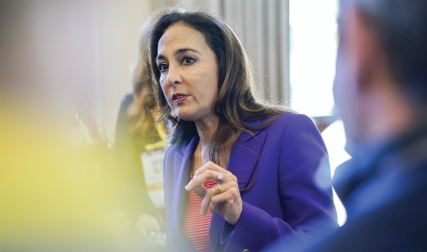Lord vs. Lincoln Thanks to Lauren Vespoli ’13 and Seymour Wheelock ’40 for their “Dispatches from the Civil War” [May/June]. As they mention, after President Lincoln called in 1861 for 75,000 volunteers for three months’ military service, Nathan Lord, president of the College, expressed concern such service would be a detriment to students’ studies. Once strongly anti-slavery, Lord had decided some years earlier that slavery was a divine institution. Lord’s views did not lead him to keep African Americans from attending Dartmouth, and a few did so, but things came to a head after the battle of Gettysburg in 1863. When the College trustees moved to award an honorary degree to Abraham Lincoln, Lord cast a negative vote. Before the trustees could act against him he resigned the presidency.
Peter Bridges ’53 Arlington, Virginia
Frame Worthy Literally the day after seeing the stunning photos of Joel Sternfeld ’65 [“Let There Be Color,” May/June], I had my own “McLean” moment right here in Vermont. As an EMT on a local rescue squad, I was standing by while area volunteer fire companies conducted a controlled burn. After an hour of tactical maneuvers inside the structure, crews were withdrawn and the house was ignited. Flames roared 50 feet into the spring air while firefighters in full battle dress posed for cellphone pictures of each other in front of the inferno. One captain grabbed a multi-forked stick and began roasting marshmallows. Life imitates art imitating life. Professor T.S.K. Scott-Craig (“Philosophy 44,” beloved and missed) would have been pleased.
Richard A. Bernstein ’65 Jericho, Vermont
The Dhillon Factor I was disturbed to read the following in your profile of former Dartmouth Review editor Harmeet Dhillon ’89 [“The Outsider,” May/June]: “As a staunch conservative in one of the nation’s most liberal cities, she’s also not watching the inauguration festivities that launch Barack Obama’s second term. ‘He seems to want to turn this country into some kind of European-style socialist state,’ she says.” This is a really tired sound bite that was intellectually dishonest in the first place, in the sense that you’re materially conflating lots of nuance and fact in order to scare your audience. I found the rest of the article interesting, but I bristle when I see DAM deign to traffic in the common propaganda and alarmism that obscure any semblance of rational public discourse.
Julian Kelly ’04 New Canaan, Connecticut
Your article about Dhillon was awkward because you were trying to describe her as a fiscal conservative and social liberal. The perfectly good word for which you were not searching is Libertarian. This is the political philosophy that has a chance of dragging the Republican Party into the 21st century. The Democratic Party is, of course, lost in early 20th-century socialism, as demonstrated by Obamacare.
James Krug ’59 Olympia, Washington
Like A Rock Your interesting article [“Ties that Bind,” May/June] reminded me of my own contact with Gov. Nelson Rockefeller ’30. In the 1950s I wrote to ask my fraternity brother for a contribution to our house-rebuilding fund, and he responded—with $5. In the 1960s I lived in Venezuela, where he and his brothers had a grand estate in Caracas and a huge ranch in the interior that they rarely visited. Through their development company they introduced supermarkets to the country and developed a breed of cattle that yielded the best local steaks. Meeting some of Rockefeller’s staff when I was chairman of the finance committee at the 1972 Nixon inauguration resulted in my being invited to New York City to join the core group of Rockefeller for President in 1976. And there my shaggy dog story ends. Presidential and vice presidential scandals coupled with Rockefeller’s appointment to vice president ended Rocky’s 1976 run, but still when people ask me about my politics I say, “Rockefeller Republican.”
Dan Searby ’57 San Francisco
Rockefeller should be remem-bered for three great crimes: The cruelest is the Attica prison massacre, which the article noted hurt the career of his associate Robert Douglass ’53. In 2011 further information came out that pinned the responsibility for its bloodshed on Rockefeller’s impatient raid, not the prisoners. The second act that haunts Gov. Rockefeller is his legacy of inappropriately harsh drug sentencings, which ruined many lives as it incarcerated nonviolent users at great expense to the people of New York State. When the policy’s influence spread, it cost the rest of our nation too. The third crime is one against culture, which ranks with the Taliban’s destruction of Afghanistan’s Bamiyan Buddha statues in 2001, and proves why the Rockefeller name should not appear on a campus distinguished by its Orozco mural cycle. In 1932 Nelson Rockefeller negotiated the commissioning of a mural by Diego Rivera for his family’s Rockefeller Center; the family promptly eradicated it in 1934 when it displeased them. Isn’t it time to chip Nelson the Barbarian’s name off the front of any Dartmouth College building and rename the building Rivera Hall?
Mike Mosher ’77 Bay City, Michigan
Climb Every Mountain My doctor father, Wally Lobitz, was the faculty advisor to the Dartmouth Mountaineering Club in the 1950s, and I grew up with the Everest climbers from the College. All of the articles in Jan/Feb were great, but there is another Dartmouth graduate who deserves mention: Ned Gillette ’67, my roommate for two years. Post graduation Ned became the ultimate adventurer. He told me once that his goal was to do things that hadn’t been done or even thought of. He made a winter traverse of the Brooks Range in Alaska. He designed and built a sea- going rowboat, The Sea Tomato, and rowed across the treacherous 600-mile Drake Passage from the tip of South America to Antarctica. Although Everest had been climbed, he was the first person to circumambulate it—not easy because the political climate between Nepal and Tibet prevented crossing the border between them. He said since he was there he would climb Everest, too, and he did. He and his wife, Suzy Patterson, rode camels on Marco Polo’s Silk Route 6,000 miles from China to the Mediterranean Sea—a logistical nightmare because of all the borders they had to cross. Tragically, in 1998, Ned was murdered by bandits in Kashmir, Northern Pakistan, where he and Suzy were reconnoitering their next adventure.
John Lobitz ’67 Denver
Ad-versary I found the back-cover ad for a petroleum extraction company on your “Spirit of Adventure” issue [Mar/Apr] to be shocking, ironic, paradoxical and objectionable—incongruent with what should be Dartmouth’s “green” ideals. I have signed a petition urging Dartmouth to divest from fossil fuel companies, and urge my fellow alumni and current students to do the same. You can sign the petition and write to the administration at gofossilfree.org. More information on how to get involved with the climate movement can be found at 350.org. Please add your voice to the climate debate.
Bob Bauer ’82 South Strafford, Vermont
Warming Up? It’s great that Sen. Rob Portman ’78 now supports gay marriage [“Newsmakers,” May/June]. Let’s hope more senators’ and representatives’ kids come out as climate scientists.
Richard Winkler ’74 San Diego
Call to Action Let me begin by congratulating you on the great improvement of the magazine over what it was 20 years ago. The Sept/Oct 2012 issue about Dartmouth alums in the military was especially good—informative and moving. I must record how much I owe to the College and not forget. For all the criticism of the Greek system, things are not as bad as in my day, when poor Ray Cirotta ’49 was killed by having his head knocked against a radiator in a hazing incident from which the perpetrators emerged with only a slap on the wrist. One wondered then, as I still do, if boys without connections would have been treated so. The present situation is, of course, less dire but serious enough. It is regrettable that the College should be brought into disrepute by the Greek goings-on, reported in such places as Rolling Stone. I am not against the Greeks. They have a helpful social role to play. Let them do just that as, for example, the DOC has always done. But let’s have some talk about it. History tells me that every time the subject comes up, a committee is called and writes a report, whereupon nothing is really done. Let’s have a public debate, in DAM, say. Are we, as a community, so careless of the College’s reputation that we will let it go, yet one more time, without any real action?
Henry P. McKean ’52 New York City




